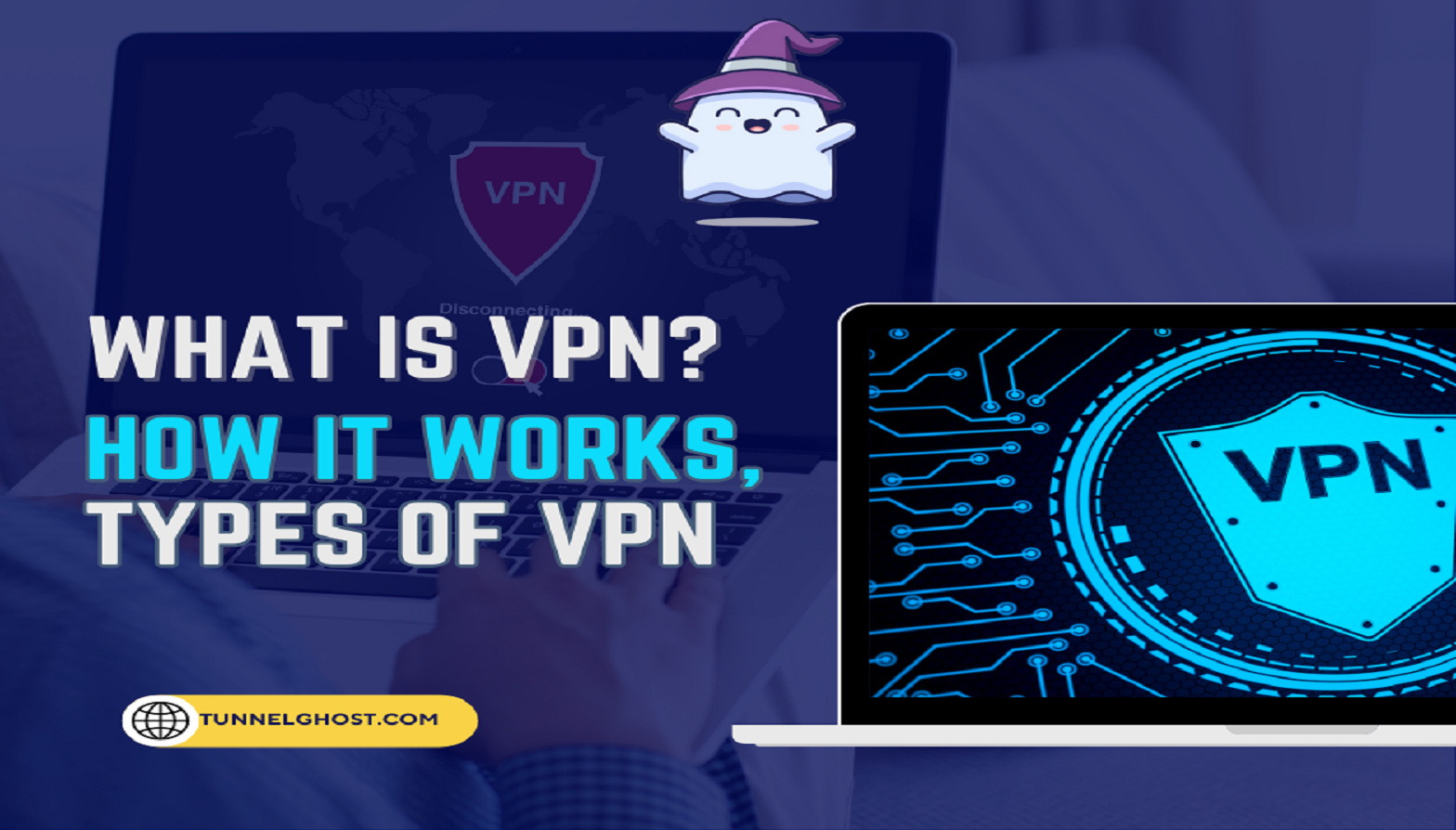What is VPN? How It Works, Types of VPN | Tunnel Ghost
Secure your online privacy and browse anonymously with our reliable VPN service. Experience fast and encrypted internet connection.
VPN means "Virtual Private Network," which is a way to connect to a network safely when using a public network. It secures the data you send online and hides your online identity. It makes it harder for others to track what you do online and steal your information. The encryption happens right away.
Virtual private network work as a go-between for your Internet service provider (ISP) and the rest of the Internet. When you connect to the Internet through a Virtual network, you use the Private network provider's personal computer to connect to the Internet.
One of the best things about a network is that it encrypts your data before sending it. Your IP address is also hidden when you use a virtual provider, which keeps your information safe online.
How Does It Work?
It works by sending your device's internet link through the VPN's secret server instead of through your internet service provider (ISP). It means that when your data is sent to the Internet, it comes from the virtual network, not your computer.
When you link to the Internet, the Private New York works as a middleman, hiding your IP address, a line of numbers that your ISP gives your device, and protecting your identity. Also, if someone steals your data, they can read it once it reaches its end location.
A virtual private network creates a private Tunnel Ghost between your device and the Internet and hides your essential information through encryption.
The Basics of VPN:
When you use a virtual network, your info stays secret because of encryption.
With encryption, information is hidden by making it look like noise, so it can't be read without a solid password called a key. This key breaks the complicated code your data has been turned into. This key is only known by your machine and the virtual network server. The process of making protected information understandable again by using the key is called "decryption." It is the same thing as "decoding" your data.
For example, when you put your credit card information into a shopping website, it is protected and can only be read once it reaches its final location.
Different virtual private network services use different kinds of encryption, but in a nutshell, this is how Private network encryption works:
- Your data is sent through a safe path when you link to a virtual private network, and It means that your data is changed into a code that can't be read as it goes from your computer to the virtual network server.
- Your device is now on the same local network as your virtual one. So your IP address will be the IP address of one of the sites run by your virtual network provider.
- You can browse the Internet however you want, knowing the network will keep your personal information safe.
Types of Virtual Private Networks:
There are many kinds of Private networks, and it can be hard to tell how they vary. But all fall into one of two groups, making it easier to choose the right one.
1- Site-to-Site:
A site-to-site virtual network is a private network that hides private intranets and lets users of these secure networks access each other's resources.
A site-to-site virtual private network is helpful if your company has multiple locations, and each site has its local area network (LAN) linked to the vast area network (WAN). Site-to-site Private networks are also helpful if you have two different intranets and want to send files between them without letting users from one intranet access the other.
Big businesses most often use site-to-site. They are hard to set up and give you less freedom than SSL. But they are the best way for big departments to talk to each other and with other departments.
2- Add-ons for Web Browsers:
Specific networks may be added to Chrome or Firefox. Add-ons for popular browsers like Chrome and Firefox abound, and Opera includes a virtual network by default. Your data will only be safe when you're using that browser. No guarantees can be made for Ultimate Server Locations of any other applications. In addition, browser-based Private networks have a slightly higher risk of leaking your IP address.
Choose a provider that provides other virtual network services if you want to use a browser add-on or extension. A data harvester is a malicious browser extension that steals your personal information without your knowledge or consent.
3- SSL:
Not all companies provide their workers with laptop computers that may be used for remote work. During the corona crisis in the spring of 2020, several businesses struggled due to a lack of necessary supplies. A personal computer, laptop, tablet, or mobile phone is typically used in these scenarios. In these situations, businesses turn to SSL-virtual network solutions, often deployed through dedicated hardware appliances.
To access the company's login website, an HTML-5 compatible browser is often required. Browsers that support HTML-5 are widely distributed and may be used with almost any OS. User names and passwords are required to get entry.
4- Client-Server:
In a virtual network of Private DNS, the client's connection is analogous to running an extension cord from your home computer to the office. Using the encrypted line, workers from home may access the business network and perform their duties as if they were physically there.
However, a virtual network client must be downloaded, installed, and set up before this can be accomplished.
In this setup, the user's usual connection to the Internet is bypassed in favor of a secure tunnel established by the virtual network service. The virtual network tunnel portion of the trip is therefore reduced in length. The VPN may encrypt the data before it is made accessible to the user, eliminating the need to construct an encryption tunnel to mask the user's internet connection.
This Private network is becoming more popular and ideal for unsecured public WLAN service providers. Data is encrypted from your device to your service provider, protecting it from prying eyes.
Bypassing limitations on the user's internet access (for example, if the government of that nation prohibits internet access) and preventing ISPs from viewing data that, for whatever reason, stays unencrypted are further benefits.
This Virtual network connectivity benefits include increased productivity and easier access to all internal corporate resources. If a suitable telephone system is in place, an employee may connect to it via a headset and carry on business as usual, just as if they were in the office.
Customers, for instance, need to find out if an employee is physically present at the office or working from home.
5- Router Private network:
A network can also be set up with a server with Private network support. It is excellent to protect more than one device because it will cover every device linked to the router. You won't have to set up the virtual network on each device separately. Also, you'll only have to sign in once, and your router will always be connected to your virtual network.
Connecting your computer to a virtual network is easier than you think. You must sign up for a virtual private network service first and then a computer. The handiest type of router to get is one that works with Private networks immediately, so you only have to enter your Private network information. The price of these routers may be higher than regular routers, but the ease of use makes it worth it.
6- Hardware Networks:
Hardware VPNs are better than software in several ways. Hardware Private networks not only improve security, but they can also help spread the load of many clients. A computer browser tool is used to handle administration.
A Virtual Private Network that runs on hardware costs more than one that runs on software. Hardware Private networks are better for more prominent businesses because of how much they cost. Many companies sell products that can be used as hardware networks.
7- Dynamic Multipoint:
Data can be sent from one place to another without going through the server or router at a company's headquarters. With servers and firewalls, concentrators work together for a mesh service.
Each remote site has a server to link to the device (hub) at the company's offices. It gives access to the available resources. When two spokes need to share data, like for a voice over IP (VoIP) phone call, the spoke will reach the hub, get the details it needs about the other end, and set up a dynamic IP Address Masking link straight between them.
Risks and Restrictions of Virtual Private Networks:
Virtual networks are meant to fill an essential role for businesses in the modern world, but they could be better. They have a few drawbacks that make them less valuable and hurt company security.
Visibility Is Broken:
These are made so every user has a private link between two points. It is hard for a company's security team to maintain network awareness to find and respond to threats.
No Integrated Security: If a company lacks integrated security, it must use other security solutions to find and stop harmful material and set up more access controls.
Poor Route Planning:
With a "hub and spoke" approach, it can ensure that all data goes through the organization's core security stack to be checked. As cloud apps and online work become more popular, this delay may not be the best way to get from the client to the cloud application or the Internet. Find out more about the argument between SD-WAN and Private Networks.
VPNs don't work well as a point-to-point security option because they need to spread better. For example, in a fully linked network, the number of site-to-site Private New York links grows in a way that is proportional to the number of sites. It makes a network system hard to set up, keep track of, and keep safe.
Endpoint Vulnerabilities:
Phishing and other cyber-attacks can take over endpoints that should be able to connect to the Virtual Private network. Since the endpoint has full access to the Private virtual New York services, so does the threat actor who has taken over the endpoint.
Many companies need safe ways to access the Internet from afar, and VPN's limits make it essential to look for options. Contact us to learn how to set up secure online access on your network. And don't be afraid to ask for a free sample of Check Point's remote workforce security solutions to find out how they can help your organization's teleworkers be more productive and safe.
Why Would You Want to Connect To A VPN?
A Private New York link hides your online data flow and prevents anyone from seeing it. Anyone with network access who wants to can see data that isn't encrypted. With a network, hackers and other cybercriminals need help figuring out what this information means.
Secure Encryption:
You need a key to the encryption to read the data. Without one, a brute force attack would take machines millions of years to figure out the code. With a Virtual network, your online actions are safe even on public networks.
Disguising Your Location:
Private New York sites act as proxies for you on the Internet. Your actual location can only be visible if the general location data comes from a computer in another country. Also, most Private New York services must keep records of your work.
On the other hand, some companies keep track of what you do, but they don't share this information with anyone else. Any possible record of how you use the site stays hidden forever.
Access to Restricted Content:
Only some people can always get to regional material on the web. Standard links use computers in the same country as you to determine where you are. It means that you can't get content from home when you're away or from other countries when you're at home. With Private network location faking, you can connect to a computer in a different country to "change" where you are.
Secure Data Transfer:
You must access essential files on your business network if you work from home. A secure link sends this information for safety reasons. Often, you need a Private network link to get into the network. VPNs link to secret computers and use encryption to make it less likely that data will get out.
Challenges of VPNs:
However, there are several drawbacks to utilizing a VPN, such as:
- A Private virtual network may not work on all platforms.
- VPNs can't protect you from every danger.
- Paid networks are safer and more reliable.
- A Private network could slow down the speed of the Internet.
- They can help protect your privacy, but they only do some things. For example, computer fingerprinting can still be done.
Any device that connects to a private network through a Private network could bring malware into that network unless the Virtual Private Network connection process includes a step to check the health of the connected device. Attackers with stolen passwords can access network resources, such as switches and routers, if the device is not restricted to see if it follows the organization's security policies.
Security experts suggest that, in addition to these, network managers consider adding software-defined perimeter (SDP) components to their security infrastructure to reduce the number of possible attack sites. With the addition of SDP programming, both medium and large companies can use a zero-trust approach to reach network settings on-premises and in the cloud.
Different Price plans:
Most Private network services fall into three price ranges: luxury, cheap, and accessible.
Most of the best network companies are in the paid category. As the name suggests, these services stick out because of the quality of their tools and how they balance privacy, security, and speed.
Premium Plan:
The express plan includes the fastest market speeds and valuable extras like split tunneling, anti-DDoS servers, and obfuscation for getting around Private network blocks.
Premium plans have easy-to-use apps for all major platforms and fast, helpful customer service, including live chat. All of this, of course, costs something. These are pricey, especially if you want a one-month plan. However, their long-term goals often make up for this with significant savings.
Free Plan:
On the other hand, cheap Private networks usually use low prices as their main selling point. In some situations, these low-cost services deliver high-quality results with expensive standards.
Private Internet Access is one of the cheapest networks, but it gives you access to 29,650 sites, SOCKS5 proxy support, and a kill switch. Still, there's a reason why it's in the budget category: customer service and available speeds could be better with most luxury companies.
Private Plan:
A private network is another cheap service that does a lot for what it costs. But it only has about 200 computers, so it's best for people who want a small, low-key business.
In short, the significant difference between premium and budget (besides price) is that premium offers an exclusive deal without skimping on anything. In contrast, budget plans can provide cheap service by focusing on what's most important.
What to Consider When Choosing a Virtual Private Network:
If you know that a Private network is a good idea, the next step is to pick the right one for you.
Before you use a Private network, consider the following:
1- User-Friendliness and Good Service:
VPN software is usually easy to use. If you're using a Virtual network to protect your connection, your service has a lot of lessons and other tools you can use. If you prefer customer service, read a few online reviews to see how other customers rate the service.
2- Compatibility of Devices:
You can use it on computers, tablets, and phones. Check if your Private network company works with your devices before buying their service.
Notice that not all routers work with networks, so ensure yours does. Reviewers often say that Nordis the best Private network for multiple devices.
3- Speed of Internet link:
Your device and the private network methods will decide how quickly you can connect to Game Better (VPN for gaming). Data encryption can take a lot of computer power. Check if your router and processor can handle a Private network without slowing down.
People can access our names and personal information with the proper steps. Private networks can keep your info safe and confidential online. Even though a Private network has many benefits, following other best practices to protect your privacy online is essential.
Various Virtual Private Network Protocols:
A Virtual network protocol is an underlying technology your virtual platform service employs to provide an encrypted and secure connection to the Internet. The network protocol, which combines encryption standards and transmission protocols, determines how data works between your device and the Private server.
Currently, the most used Private network protocols are:
Point-to-Point Tunneling Protocol:
This protocol, developed by Microsoft, is one of the first still in use. Because of this, it is only practical on earlier versions of Windows while being quick and straightforward to implement. But if that's all a service provider provides, go elsewhere.
Layer 2 Tunneling Protocol with IPsec (L2TP/IPSec):
This protocol is a hybrid of PPTP and Cisco Systems' L2F protocol for creating private networks. It's more secure than PPTP and produces a more private data tunnel, but it doesn't encrypt or hide your data.
Microsoft has developed a service known as Secure Socket Tunneling Protocol (SSTP), which functions similarly to the protocols used by secure websites. This protocol is highly safe since only the sender and receiver know the secret.
Version 2 of the Internet Key Exchange protocol:
IKEv2 is an improved and modernized variant of L2TP developed jointly by Microsoft and Cisco. This protocol excels on portable gadgets.
Open Network:
It is a free protocol and is open to the public. Don't let the word "open source" scare you; it just means that many people are actively developing the technology and that anybody, from individuals to large corporations, is free to use and change it as they see fit. Several prominent audits have already attested to its efficiency. Open is the most secure protocol, providing an additional layer of security on top of the protocols above' protection.
Conclusion:
A VPN is a strong tool that improves internet privacy and security by building a private link between the user's device and a faraway network. It encodes data, hides the user's IP address, and allows safe access to network services. Users can choose the Private network that works best for them, whether they need online access, a site-to-site connection, or to browse the web safely.




